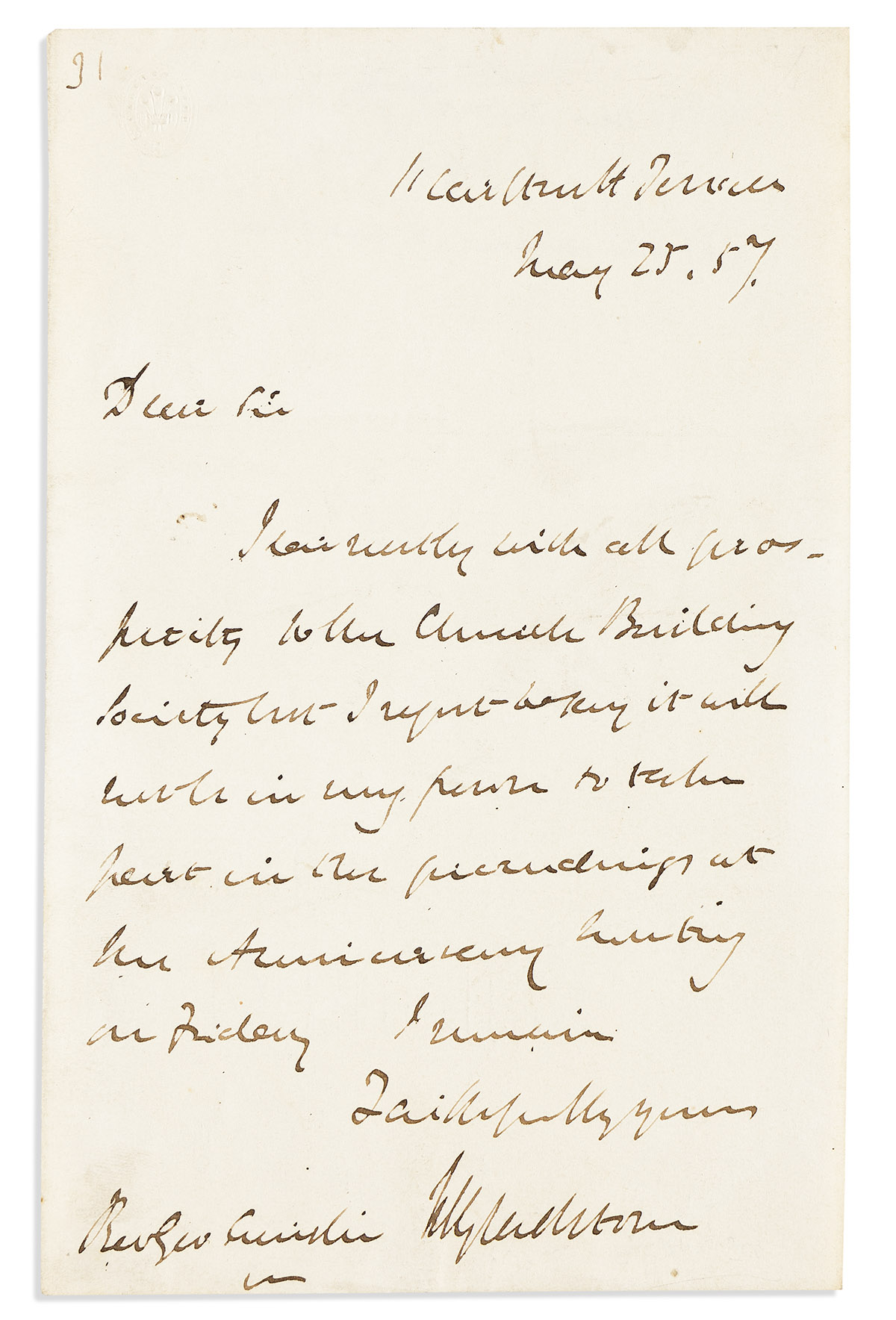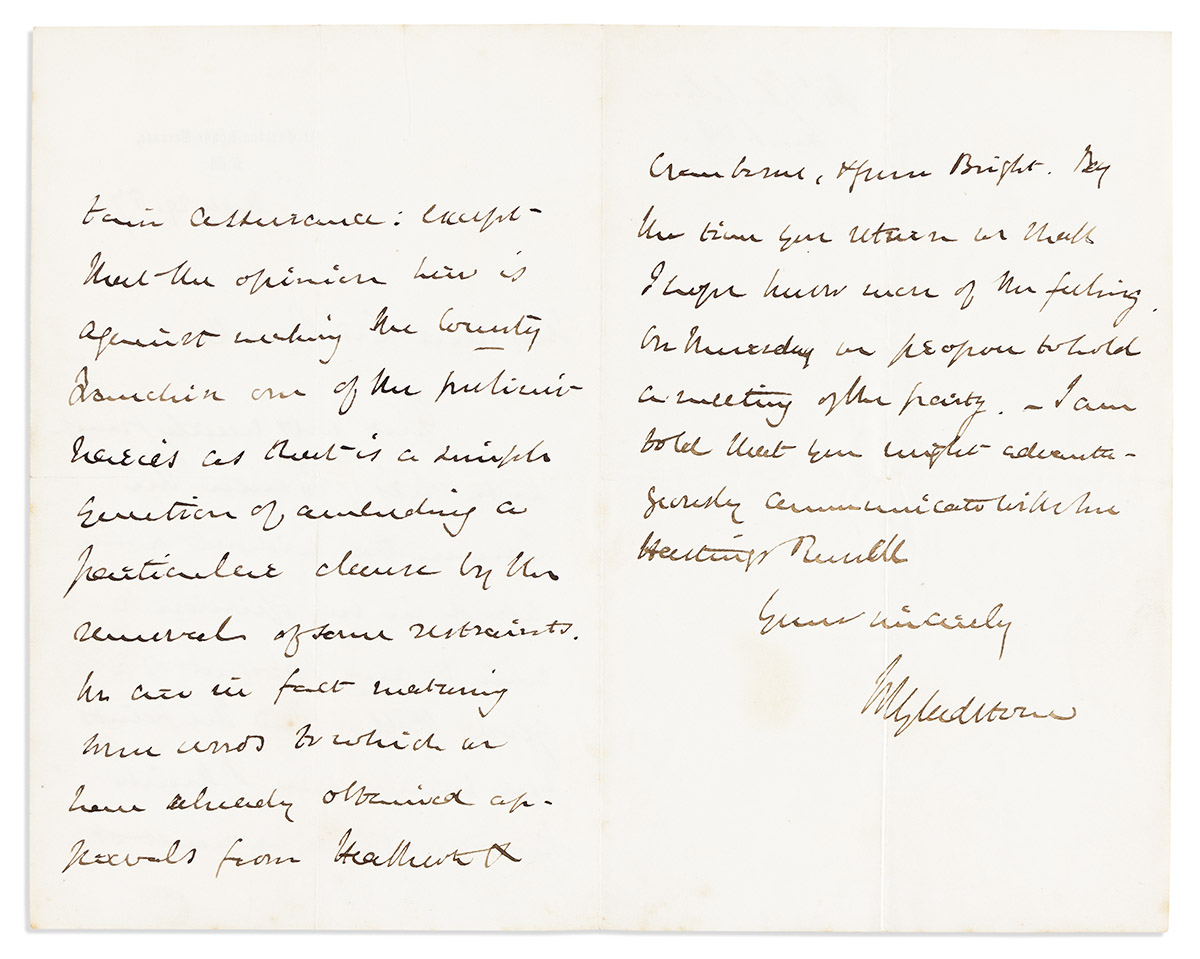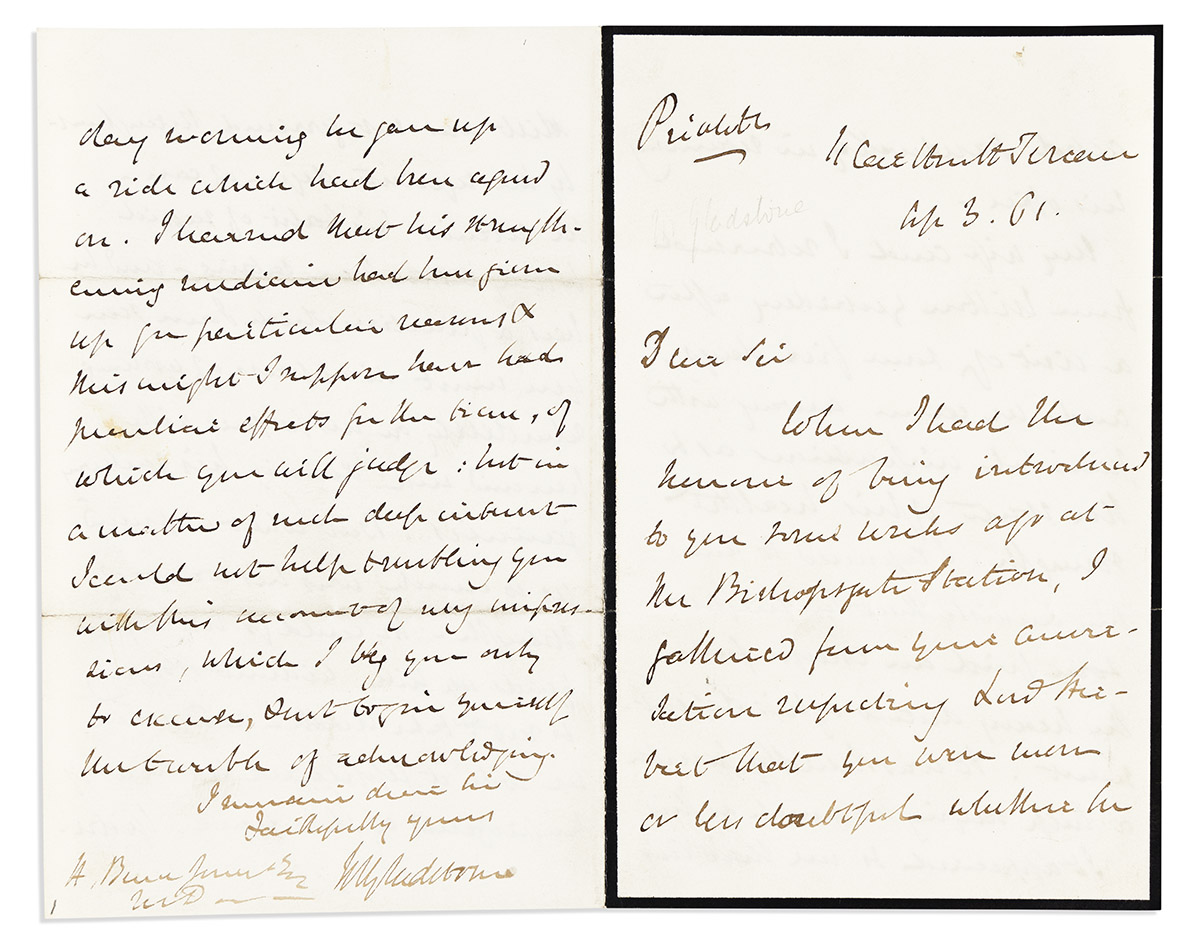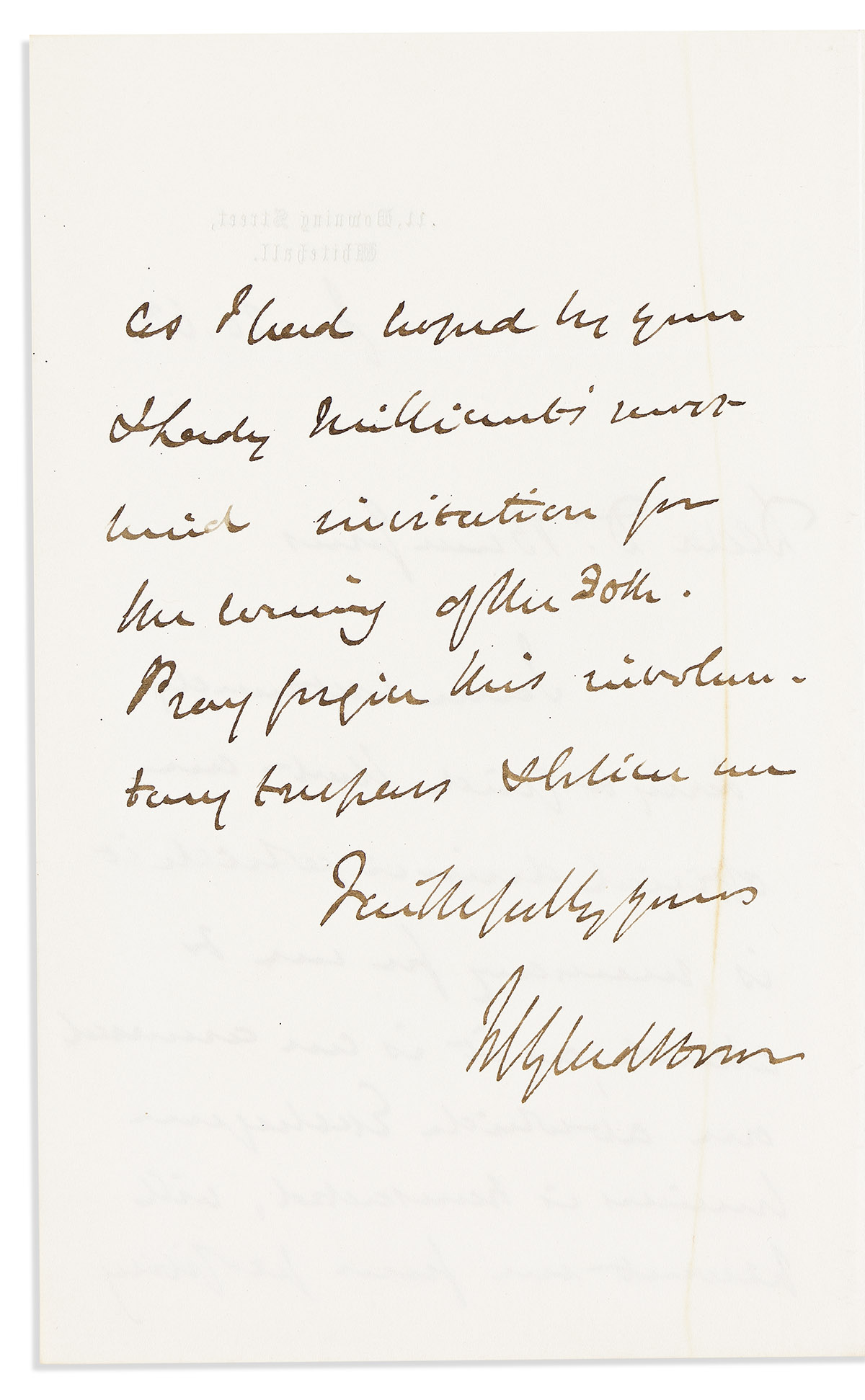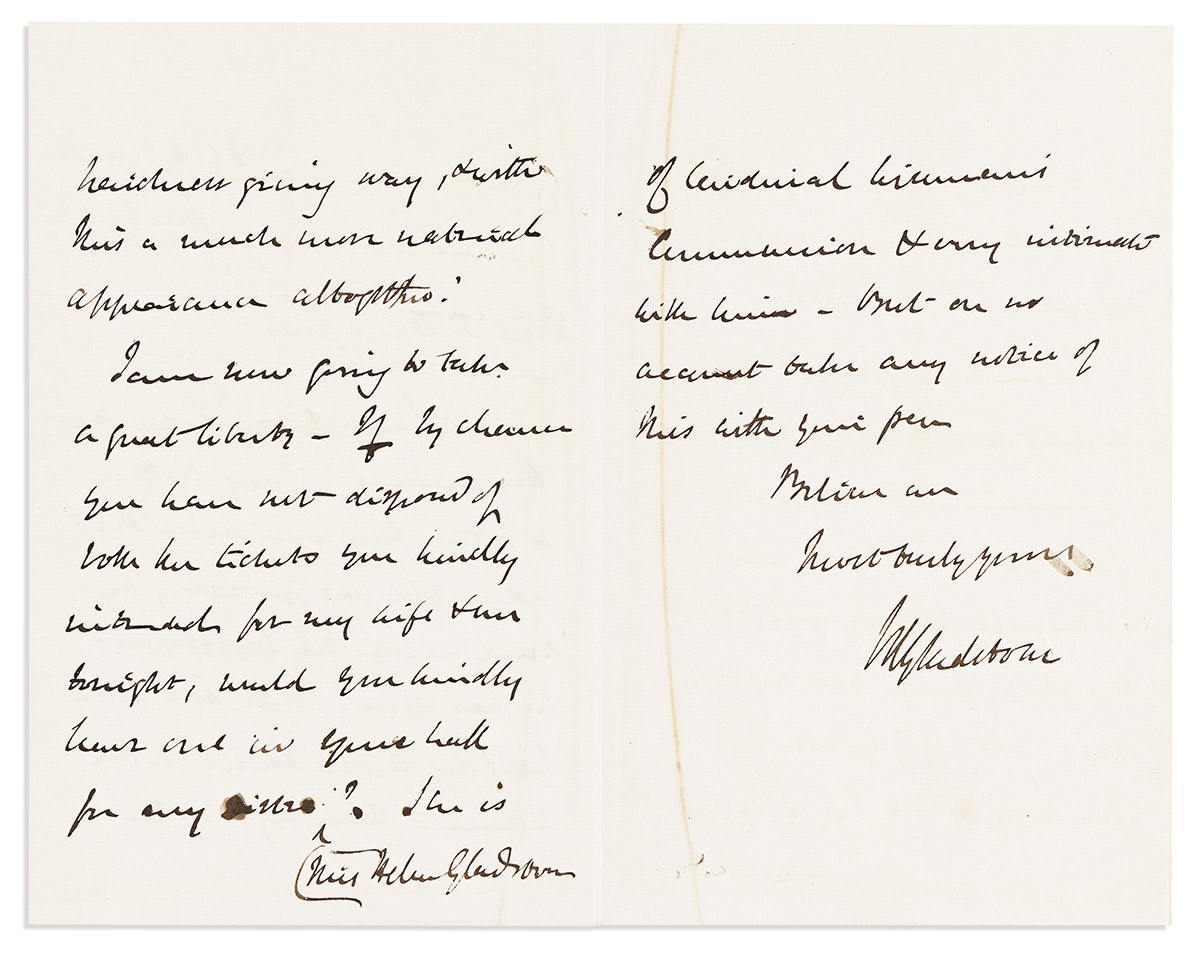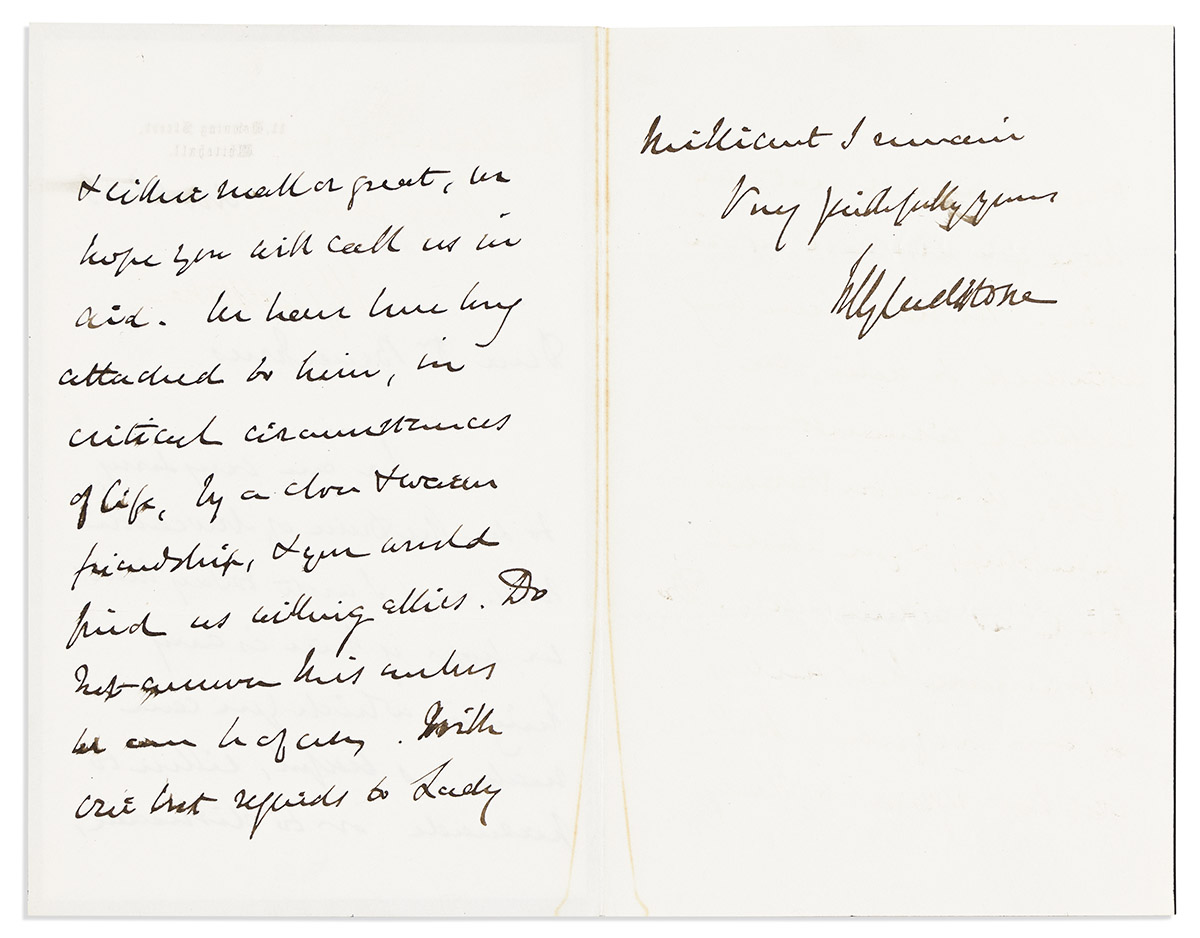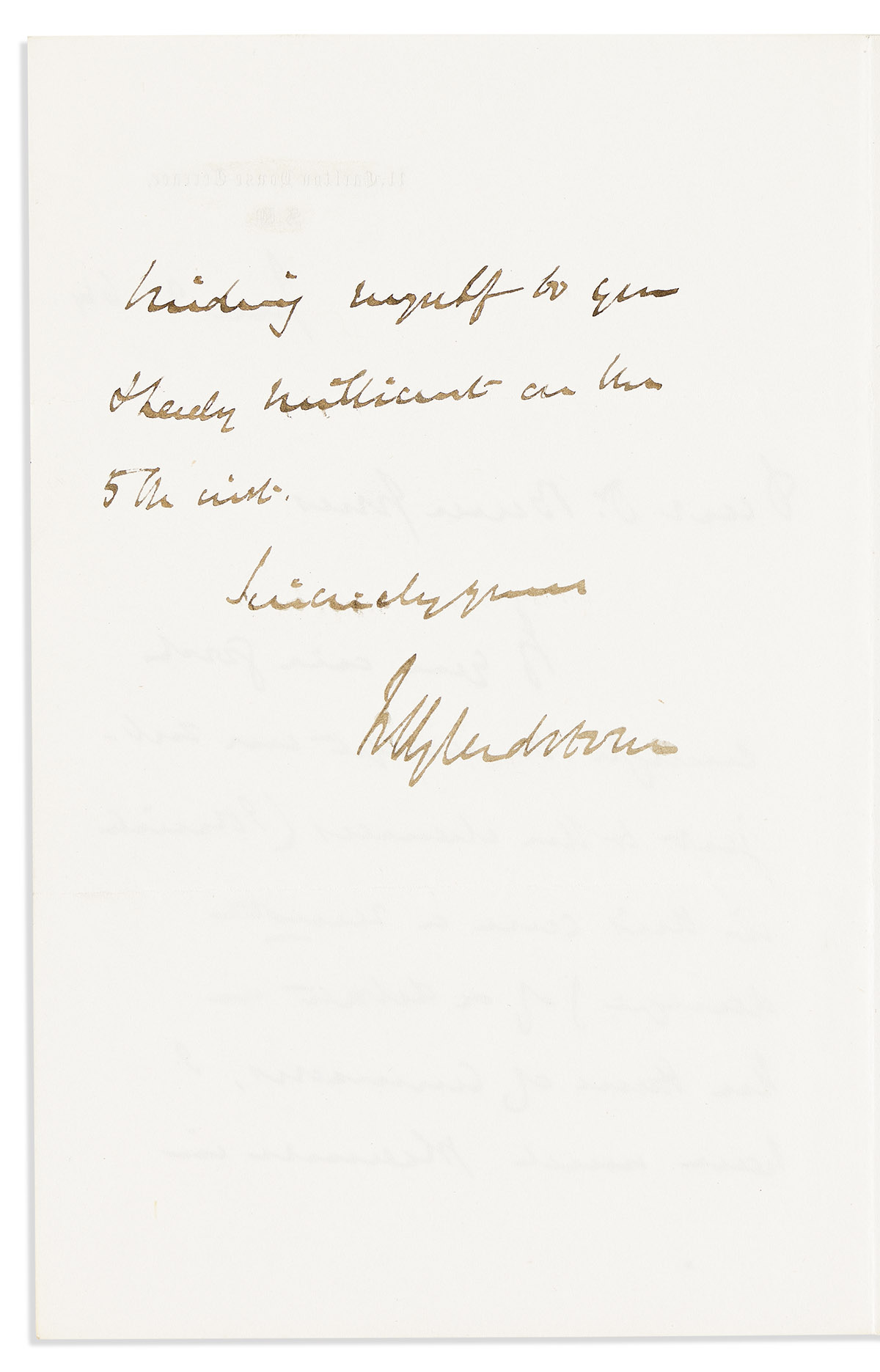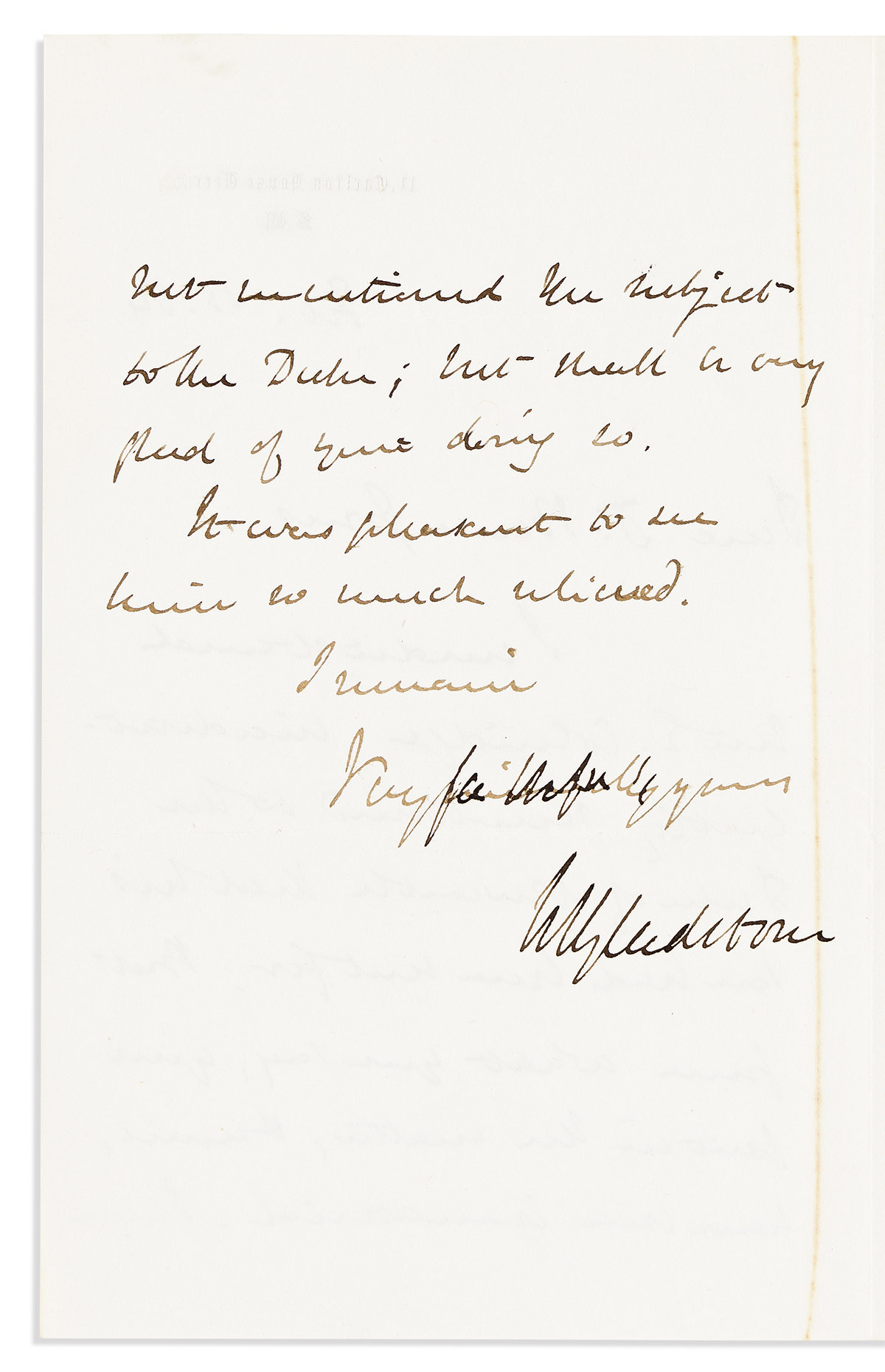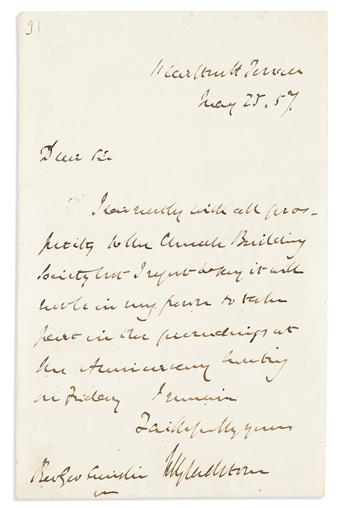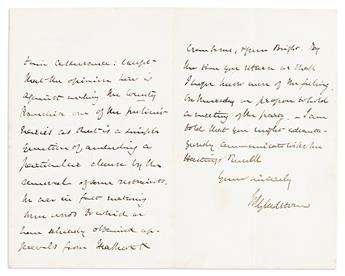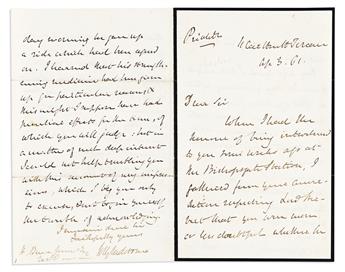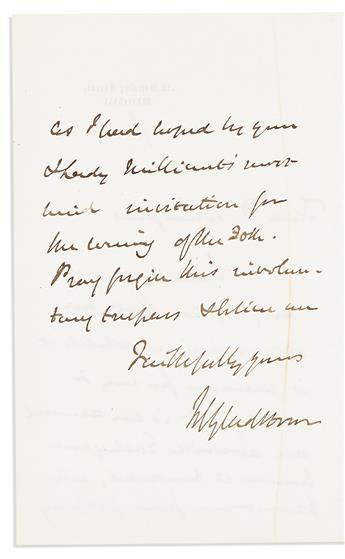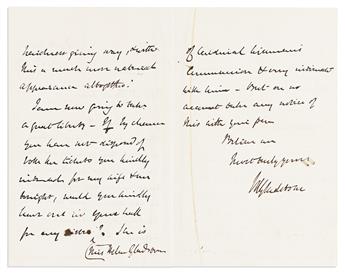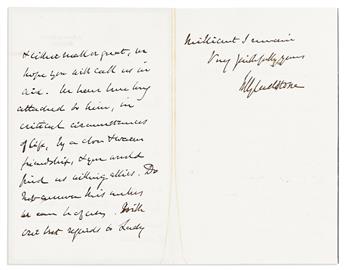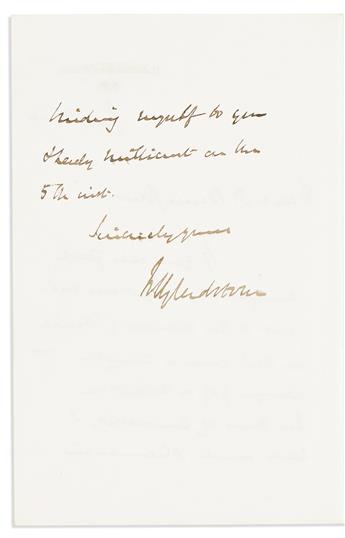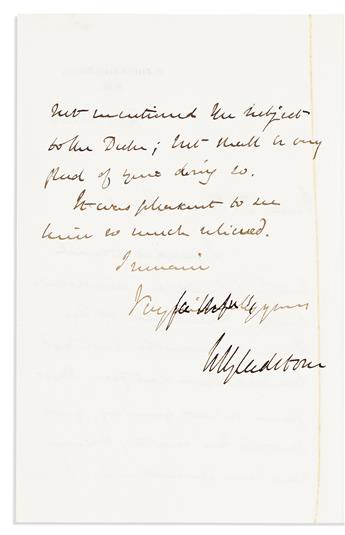Sale 2674 - Lot 101
Unsold
Estimate: $ 3,500 - $ 5,000
GLADSTONE, WILLIAM EWART. Group of 23 Autograph Letters Signed, "WGladstone," to various recipients, including former Prime Minister John Russell, physician Henry Bence Jones, Lord Monkswell, or others. The letters to Russell, mostly concerning historic parliamentary reform (the "Reform Bill"), comparing himself to Lord Byron when the latter corresponded with Walter Scott, mentioning his views on the disestablishment of the Irish Church, suggesting a reform to the distribution of honorary distinctions to maintain fairness, and reporting the death of former prime minister Edward Smith-Stanley. The letters to Jones, expressing worry about the poor health of Sidney Herbert, cancelling an engagement due to an Exchequer commitment, reporting improved health of his brother, requesting a ticket [to a lecture?] for his sister, offering to help in his treatment of the Duke of Newcastle, agreeing to a meeting if there is no debate in the House of Commons, and clarifying some confusion about the son of the Duke of Newcastle involving [master at Eton College, Rev. Edward] Coleridge. The other letters, concerning the Rebellion Losses Bill, the Succession Duty Bill, declining invitations from the [Incorporated] Church Building Society and an unnamed organization of artisans, discussing the use of iron in ancient Troy, suggesting that a poem would have been improved if written on a more worthy subject, arranging a meeting, mentioning his view on the taxation of ground rents. Together over 65 pages, 8vo or smaller, many on "11 Downing Street" stationery; generally good condition. Vp, 1849-90
Additional Details
To Russell: 29 March 1867: ". . . To enter the Committee without a key would in my opinion be ruin to any prospect of a good Bill. And the points you name are I think those on which we must obtain assurance: except that the opinion here is against making the County Franchise one of the preliminaries as that is a simple question of amending a particular clause by the removal of some restraints. . . . [W]e have already obtained approvals from [William] Heathcote & [Robert Gascoyne-Cecil, Viscount] Cranbourne, & John Bright. . . . On Thursday we propose to hold a meeting of the party. . . ."
19 April 1867: "Now that we have determined the point as to abandoning the initiation in amending the Reform Bill, for the time, I am desirous that we should consider how far our actual basis as to the substance of any such amendments is altered by the recent vote. In the hope . . . of conciliation, . . . we become responsible for the plan of a five pound rated value franchise, combined with payment of rates, and with an exemption of all occupants below that limit from personal rating.
"Our offer has been refused. We have been thrown overboard, not by the Radicals, who might with some reason have opposed us, . . . but by the timid men, the Adullamites and the 'moderate' Conservatives who refused to act with Heathcote and Cranbourne.
"By the effort we thus made, we seriously compromised . . . that section of the real Reforming party (the only party we can rely on for ultimate success) which took . . . [Benjamin] Disraeli's bait of household suffrage.
"Our effort, as a Liberal party, to limit in principle an enfranchisement proposal by a so-called Conservative Government, involved as we well knew some of the elements of a false position.
"I hold that, after the refusal of our offer, we are entirely free, and should reconsider our position.
"Prima facie, our course would be . . . to aim at a real household suffrage, without the Reform Bill.
"I am . . . still for a limit, if the Reforming party will accept one.
"But I think we ought to abandon the standard of rateable value which we adopted from avowed deference to others, and fall back upon clear annual value, or better still as gross estimated rental: the rational . . . method of fixing a standard for the franchise.
"Again as to the lodger-franchise. . . . I think eight pounds clear annual value, or four shillings a week of actual rent (unfurnished) as an alternative, would be nearer the mark.
"In any case the Government plan is now in possession of the field . . . . I think we should make up our minds whether to be prepared to accept it . . . .
In a postscript: ". . . '[H]ousehold' suffrage involves the enfranchisement of a very uninstructed and a very dependent class: indeed in the small rural boroughs it involves . . . the enfranchisement of the peasants . . . ."
27 April 1867: ". . . [I]t is a most important question to decide whether we shall now abandon the idea of a limit altogether.
"It appears to me clear that if we go to household suffrage, we must have an extensive redistribution of seats. . . .
"[John] Lambert is impressed with the idea, in which I very much concur, that the rural structure of many of our small boroughs, with household suffrage . . . will render it very difficult to refuse a like occupation in the Counties for any length of time. . . ."
21 August 1868: ". . . For the election, what we have to drive home is the alteration as indicated by Disraeli & [Richard Bourke, Earl of] Mayo in March. . . .
"I was much interested in your comments on [Thomas Babington] Macaulay. In substance he was wrong as well as I. But I am like Lord Byron (in this point at any rate) who after his English Bards said to [Walter] Scott he was 'haunted by the ghosts of his wholesale ambitions'. Therefore it is not for me to find fault."
5 September 1868: ". . . Few are the days of the present year on which the work of giving effect to our policy about the Irish Church has not been on my mind.
"It will I think be extremely difficult, even if it be possible, for any Liberal Government to frame a complete measure in time for the Session of 1868. . . .
"Do you see no difficulty in . . . the Rent Charge to Comm'r of Education while the question itself of Education in Ireland his the subject of fierce dispute?
". . . Why would the expence of satisfying the life interests be thrown on the people of this Kingdom? Why not on the Church property?
". . . Could the R[oman] C[atholic]s be satisfied with your plan for dividing the glebes locally between Prot[estants] & Presb[yterians] in the North, . . . & all three in Leinster? . . .
"My opinion is that the centripetal force will be stronger in the disestablished Irish Church than the centripetal[?]. This has I think been proved by the cases of America and Scotland . . . ."
19 October 1868: ". . . I am not sure that I understand your object in suggesting that we should proceed by Revolutions. I have the fear that time might be lost. Do you know any precedent, in the class of measures at once so large and so contested? . . ."
13 October 1869: ". . . I should have prized very much the opportunity of talking out the question of Irish Land in which we as a Government shall have a very heavy responsibility. As we touch the subject we must try to deal with it effectually but not to admit into our measure any provisions which would despoil the landlord of his rights, and . . . release him from his duties."
To Jones: 3 April 1861: "When I had the honour of being introduced to you . . . at the Bishopsgate Station, I gathered from your conversation respecting Lord Herbert that you were more or less doubtful whether he acted prudently in returning to his office.
"My wife and I . . . came away with painful information as to the state of his health & strength. I expressed to him . . . that he might soon find an escape from the heavy duties of his department. . . .
"It appeared to me that his diet was not governed . . . by the requisite degree of care--he retains his habit of rapid bolting rather than eating--and he has a practice which I am sure you must disapprove of working relentlessly on his papers with pen and ink . . . . But what impressed us so much was his want of strength. He could go but a few yards up hill without stopping to rest . . . . [I]n a matter of such deep interest I could not help troubling you with this account of my impressions . . . ."
To others: 26 May 1849, to Benjamin Hawes: "I do not know whether to bother with the dispatches of Lord Elgin presented last night, you have received the Votes and Proceedings of the House of Assembly on the Rebellion Losses Bill but I would suggest that if they have come you would much assist Parliament in gaining its judgment upon the case by laying them upon the table. . . ."
2 February 1853, to Arthur West Haddan: ". . . [Y]ou may have noticed that I anticipated its turning upon your use of the word independent conjointly with the reference to Lord Aberdeen's speech. As to my not ranking with the opposition you were strictly within what I had said in Parliament, namely that my wish was to render any aid, which my convictions would allow, to Lord Derby. . . ."
29 July 1856, to Henry Robertson Sandbach: "I have a sufficient recollection of the subject . . . it was taken into consideration at the time when the Succession Duty Bill was before Parliament. Nor am I prepared to say . . . that in my opinion there is a strong case for altering the laws retrospectively as regards daughters in law for the presumption is that testators had made their arrangements with the . . . duty in view. At the same time I think the present Chancellor of the Exchequer is a softer hearted man than I am, and if the subject is brought forward in Parliament I shall be properly prepared to reconsider the case . . . ."
29 June 1875, to Lord Monkswell: ". . . What I said to the [Society of] Antiquaries--with misgiving--was that I did not recollect at the moment any mention of the use of iron in Troy: but that, if it was in use, it might probably have perished through corrosion.
"The case of Pandarus comes very near indeed to use in Troy, though in very small quantity and the declaration of Achilles is I think conclusive to the effect that the metal was known & used in Troy. That it was very precious is indisputable."
[17 November] 1890, to Lord Monkswell: "I cannot feel any surprise that the Committee should be unaware of my proceedings; it is nevertheless the fact that I have publicly, not long ago, & in strong terms, expressed my opinion on the taxation of ground rents: while as to rating it was as my colleague that Mr. [Charles] Villiers presents what may be called the Full-Value Rating Act which in principle I suppose to be all that is desired. . . ."
Provenance: From the Steve Forbes Collection.
19 April 1867: "Now that we have determined the point as to abandoning the initiation in amending the Reform Bill, for the time, I am desirous that we should consider how far our actual basis as to the substance of any such amendments is altered by the recent vote. In the hope . . . of conciliation, . . . we become responsible for the plan of a five pound rated value franchise, combined with payment of rates, and with an exemption of all occupants below that limit from personal rating.
"Our offer has been refused. We have been thrown overboard, not by the Radicals, who might with some reason have opposed us, . . . but by the timid men, the Adullamites and the 'moderate' Conservatives who refused to act with Heathcote and Cranbourne.
"By the effort we thus made, we seriously compromised . . . that section of the real Reforming party (the only party we can rely on for ultimate success) which took . . . [Benjamin] Disraeli's bait of household suffrage.
"Our effort, as a Liberal party, to limit in principle an enfranchisement proposal by a so-called Conservative Government, involved as we well knew some of the elements of a false position.
"I hold that, after the refusal of our offer, we are entirely free, and should reconsider our position.
"Prima facie, our course would be . . . to aim at a real household suffrage, without the Reform Bill.
"I am . . . still for a limit, if the Reforming party will accept one.
"But I think we ought to abandon the standard of rateable value which we adopted from avowed deference to others, and fall back upon clear annual value, or better still as gross estimated rental: the rational . . . method of fixing a standard for the franchise.
"Again as to the lodger-franchise. . . . I think eight pounds clear annual value, or four shillings a week of actual rent (unfurnished) as an alternative, would be nearer the mark.
"In any case the Government plan is now in possession of the field . . . . I think we should make up our minds whether to be prepared to accept it . . . .
In a postscript: ". . . '[H]ousehold' suffrage involves the enfranchisement of a very uninstructed and a very dependent class: indeed in the small rural boroughs it involves . . . the enfranchisement of the peasants . . . ."
27 April 1867: ". . . [I]t is a most important question to decide whether we shall now abandon the idea of a limit altogether.
"It appears to me clear that if we go to household suffrage, we must have an extensive redistribution of seats. . . .
"[John] Lambert is impressed with the idea, in which I very much concur, that the rural structure of many of our small boroughs, with household suffrage . . . will render it very difficult to refuse a like occupation in the Counties for any length of time. . . ."
21 August 1868: ". . . For the election, what we have to drive home is the alteration as indicated by Disraeli & [Richard Bourke, Earl of] Mayo in March. . . .
"I was much interested in your comments on [Thomas Babington] Macaulay. In substance he was wrong as well as I. But I am like Lord Byron (in this point at any rate) who after his English Bards said to [Walter] Scott he was 'haunted by the ghosts of his wholesale ambitions'. Therefore it is not for me to find fault."
5 September 1868: ". . . Few are the days of the present year on which the work of giving effect to our policy about the Irish Church has not been on my mind.
"It will I think be extremely difficult, even if it be possible, for any Liberal Government to frame a complete measure in time for the Session of 1868. . . .
"Do you see no difficulty in . . . the Rent Charge to Comm'r of Education while the question itself of Education in Ireland his the subject of fierce dispute?
". . . Why would the expence of satisfying the life interests be thrown on the people of this Kingdom? Why not on the Church property?
". . . Could the R[oman] C[atholic]s be satisfied with your plan for dividing the glebes locally between Prot[estants] & Presb[yterians] in the North, . . . & all three in Leinster? . . .
"My opinion is that the centripetal force will be stronger in the disestablished Irish Church than the centripetal[?]. This has I think been proved by the cases of America and Scotland . . . ."
19 October 1868: ". . . I am not sure that I understand your object in suggesting that we should proceed by Revolutions. I have the fear that time might be lost. Do you know any precedent, in the class of measures at once so large and so contested? . . ."
13 October 1869: ". . . I should have prized very much the opportunity of talking out the question of Irish Land in which we as a Government shall have a very heavy responsibility. As we touch the subject we must try to deal with it effectually but not to admit into our measure any provisions which would despoil the landlord of his rights, and . . . release him from his duties."
To Jones: 3 April 1861: "When I had the honour of being introduced to you . . . at the Bishopsgate Station, I gathered from your conversation respecting Lord Herbert that you were more or less doubtful whether he acted prudently in returning to his office.
"My wife and I . . . came away with painful information as to the state of his health & strength. I expressed to him . . . that he might soon find an escape from the heavy duties of his department. . . .
"It appeared to me that his diet was not governed . . . by the requisite degree of care--he retains his habit of rapid bolting rather than eating--and he has a practice which I am sure you must disapprove of working relentlessly on his papers with pen and ink . . . . But what impressed us so much was his want of strength. He could go but a few yards up hill without stopping to rest . . . . [I]n a matter of such deep interest I could not help troubling you with this account of my impressions . . . ."
To others: 26 May 1849, to Benjamin Hawes: "I do not know whether to bother with the dispatches of Lord Elgin presented last night, you have received the Votes and Proceedings of the House of Assembly on the Rebellion Losses Bill but I would suggest that if they have come you would much assist Parliament in gaining its judgment upon the case by laying them upon the table. . . ."
2 February 1853, to Arthur West Haddan: ". . . [Y]ou may have noticed that I anticipated its turning upon your use of the word independent conjointly with the reference to Lord Aberdeen's speech. As to my not ranking with the opposition you were strictly within what I had said in Parliament, namely that my wish was to render any aid, which my convictions would allow, to Lord Derby. . . ."
29 July 1856, to Henry Robertson Sandbach: "I have a sufficient recollection of the subject . . . it was taken into consideration at the time when the Succession Duty Bill was before Parliament. Nor am I prepared to say . . . that in my opinion there is a strong case for altering the laws retrospectively as regards daughters in law for the presumption is that testators had made their arrangements with the . . . duty in view. At the same time I think the present Chancellor of the Exchequer is a softer hearted man than I am, and if the subject is brought forward in Parliament I shall be properly prepared to reconsider the case . . . ."
29 June 1875, to Lord Monkswell: ". . . What I said to the [Society of] Antiquaries--with misgiving--was that I did not recollect at the moment any mention of the use of iron in Troy: but that, if it was in use, it might probably have perished through corrosion.
"The case of Pandarus comes very near indeed to use in Troy, though in very small quantity and the declaration of Achilles is I think conclusive to the effect that the metal was known & used in Troy. That it was very precious is indisputable."
[17 November] 1890, to Lord Monkswell: "I cannot feel any surprise that the Committee should be unaware of my proceedings; it is nevertheless the fact that I have publicly, not long ago, & in strong terms, expressed my opinion on the taxation of ground rents: while as to rating it was as my colleague that Mr. [Charles] Villiers presents what may be called the Full-Value Rating Act which in principle I suppose to be all that is desired. . . ."
Provenance: From the Steve Forbes Collection.
Exhibition Hours
Exhibition Hours
Aliquam vulputate ornare congue. Vestibulum maximus, libero in placerat faucibus, risus nisl molestie massa, ut maximus metus lectus vel lorem.



